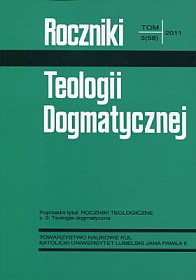Wnioskowanie logiczne jako uzasadnienie w akcie wiary
Abstrakt
Reasoning is one of the most important activities of intellect. Reasoning itself can be also a justification of human beliefs. It is connected one to another with process of acteptation of propositions as true ones. Thus it plays a role both in sciences and common thinking as well. That is why a justification is also needed as a support in domain of faith and of religious knowledge. The logical analysis of single act of faith is the content of this paper which main purpose is to point at the premisses which reasonelbe human intellect can accept revealed propositions as true ones with. To attain our delibarate purposes we present in turn two propositions from Holy Gospel according to Mark 2, 5. 10. Next, we are to reconstruct the logical arguments which brings to us demanded propositions as their conclusions, appearing as results of process based on implication. Next we are to examine the truth value of obtained premisses to show the rights which allow us to accept the revealed propositions which we are thinking about. In the same time we touch another topic. It is all about free human will and its decision which helps us to justify the propositions coming from Divine Revelation. In first part of this paper we find out something about reasoning in act of faith and we look closer on three concepts of reasonable faith. In second part we are going to lead an argument founded on two phrases from st. Mark's Gospel. By examining the argument step by step we will precise a way which revealed proposition is accepted on. In third part we figure out a few general conclusions about human free will which decision takes finally place in act of faith. An act of free will doesn't belong to human's intellectual activity so that it can be brought about by some influence from „outside”. During logical analysis of reasoning present in act of faith, we came up against moment for act of will. The act of will can be caused by the testimony of community of faith which The Revelation is bequeathed in. However obviously is that non every act of faith can be adequately translated into logical language but reconstruction and analysis put into practice wherever it could be applied, help us to understand complexity of act of faith and plurality of factors which it is built of. Even that reasonning is to be only one of them we need it as reasonable beeings and even more, we must angage our reason in our faith as far and deeply as it is possible.
Bibliografia
Kompendium Katechizmu Kościoła Katolickiego, Kielce: Wyd. Jedność 2005.
Sobór Watykański II, Konstytucje, dekrety, deklaracje. Tekst polski. Nowe tłumaczenie, Poznań 2002.
Bocheński J.: Religia (Dzieła zebrane t. 6), Kraków 1995.
Bocheński J., Parys J.: Między logiką a wiarą, Montricher: Wyd. Les Editions Noire sur Blanc 1992.
Borkowski L.: Wprowadzenie do logiki i teorii mnogości, Lublin: Towarzystwo Naukowe KUL 1991.
Hajduk Z.: Ogólna metodologia nauk, wyd. IV (zmienione), Lublin: Wyd. KUL 2007.
Herbut J. (red.): Leksykon filozofii klasycznej, Lublin: Towarzystwo Naukowe KUL 1997.
Jaworski M.: Doświadczenie religijne w ujęciu fenomenologicznym, w: Studia z filozofii Boga, religii i człowieka, t. 2, Warszawa: Wydawnictwo UKSW 2002, s. 258-274.
Kamiński S.: Pisma wybrane, t. 1-6, red. A. Bronk, Lublin: Towarzystwo Naukowe KUL 1992.
Majka J. Metodologia nauk teologicznych, Wrocław: Wydawnictwo Wrocławskiej Księgarni Archikatedralnej 1981.
Moskal P.: Religia i prawda, Lublin: Wyd. KUL 2008.
Moskal P.: Spór o racje religii. Studia z filozofii teoretycznej, Lublin: Towarzystwo Naukowe KUL 2000.
Moskal P. (red.): Filozofować w kontekście teologii, t. 1-2, Lublin: Wyd. KUL 2003.
Ratzinger J.: Wprowadzenie w chrześcijaństwo, tł. Z. Włodkowa, Kraków 1970.
Tomasz z Akwinu, św.: Kwestie dyskutowane o prawdzie, tł. A. Aduszkiewicz iin., Kęty 1998.

